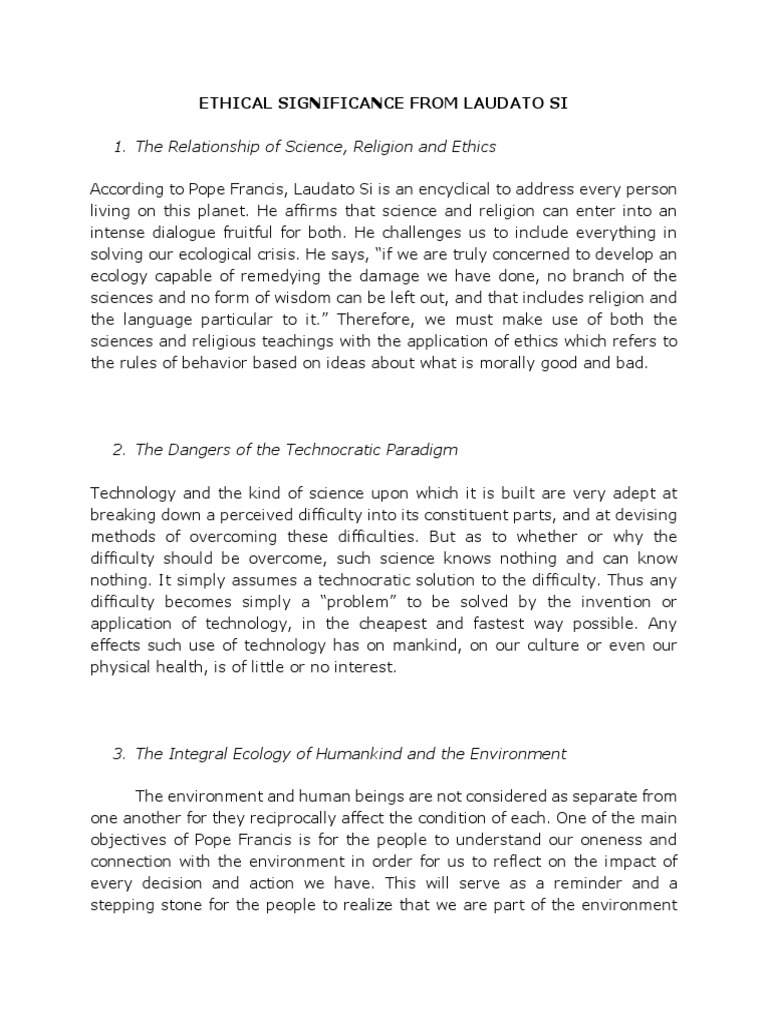In an epoch where the dichotomy between science and religion seems exacerbated, the Bahá’í teachings present a compelling narrative that bridges this divide, aligning seamlessly with the ethos of “Laudato Si’,” an encyclical that accentuates the interdependence of all creation. This exploration invites us to embark on a profound journey, akin to traversing a vast ecosystem—where every component, no matter how minuscule, plays an integral role in the symphonic collaboration of nature and humanity. The Bahá’í Faith, with its unique principles and doctrines, offers valuable insights that resonate deeply with the human experience and our stewardship over the Earth.
At the core of the Bahá’í worldview lies the indomitable spirit of harmony. This principle denotes not merely a superficial coexistence but embodies a profound unity of purpose among diverse disciplines, be it spiritual or empirical. Just as the intricate web of life flourishes within biodiversity, the synthesis of religion and science fosters a rich tapestry of understanding that transcends traditional boundaries. The Bahá’í teachings assert that true knowledge is a profound inquiry into the nature of reality, where both scientific revelation and spiritual insight coalesce to illuminate the human path.
Underpinning these insights is the idea of progressive revelation, which posits that divine truth unfolds gradually throughout human history. This evolution of understanding mirrors scientific advancement: each discovery builds upon prior knowledge, refining our comprehension of the universe. Much like the scientific method—a relentless quest for veracity—the Bahá’í Faith urges adherents to embrace reason and inquiry as fundamental tools for spiritual growth. This parallel illustrates that faith and reason are not adversaries but rather partners working collaboratively to unveil the mysteries of existence.
The encyclical “Laudato Si’,” articulates the urgency of ecological stewardship, highlighting humanity’s role as caretakers of the planet. This resonates profoundly with the Bahá’í conviction that humans are not merely inhabitants of the Earth but active participants in its evolution. The Earth, as a vibrant organism, requires our attuned care and respect, underscoring the intrinsic value of all living beings. Just as an ecosystem thrives on the symbiotic relationships among its components, the acknowledgment of our interconnectedness catalyzes a newfound respect for the natural world.
Within this framework, the Bahá’í emphasis on sustainability emerges not as a mere ethical obligation but as a spiritual practice. The act of nurturing the environment reflects an acknowledgment of the sacredness of creation itself. Here, an intriguing metaphor surfaces: consider the world as a garden, cultivated with diligence and reverence. Each plant, flower, and insect contributes uniquely to the overall vibrancy of this garden, emphasizing the critical importance of biodiversity. Similarly, every individual’s contributions—rooted in compassion and wisdom—enrich the communal experience, fostering an atmosphere of unity among diverse beliefs and backgrounds.
As we delve deeper into the interplay between Bahá’í teachings and ecological principles, it becomes evident that education serves as a pivotal axis. The Bahá’í commitment to the advancement of knowledge, particularly in the context of environmental issues, seeks to empower communities with solutions that are both innovative and compassionate. By amalgamating scientific research with ethical considerations, the Bahá’í framework facilitates a holistic approach to environmentalism. Educational initiatives that emphasize critical thinking and ethical responsibility foster a generation attuned to the cries of the planet, compelling a collective awakening to our planetary responsibilities.
The dialogue between science and religion is akin to an orchestra performing a symphony—each instrument contributing to a grander composition. In this metaphor, science serves as the analytical percussion, laying down a rhythm grounded in empirical observation, while religion offers the harmonious melodies that give soul and meaning to the notes produced. Together, they produce a soundscape that embodies the very essence of human inquiry and spirituality. This harmonious relationship is further accentuated by the Bahá’í tenet that reveals a universal truth: that the quest for knowledge—scientific, spiritual, and ethical—is a collective endeavor.
Moreover, the Bahá’í principle of the oneness of humanity extends its implications to our environmental undertakings. Just as diversity enhances biodiversity, embracing cultural differences enhances our collaborative efforts towards achieving global sustainability. The Bahá’í teachings advocate for a collective consciousness that transcends national, racial, and sectarian boundaries, fostering a sense of shared responsibility. In this light, protecting the environment is not merely an individual or local concern; it is a global imperative that requires united action from all of humanity.
An examination of the relationship between religion and science through the lens of Bahá’í teachings yields profound implications for contemporary society. It is a call to transcend the artificial boundaries that silo different fields of inquiry. The wisdom of integrating moral and ethical considerations into scientific endeavors is indispensable, especially in an era where technology and environmental degradation pose existential threats. The Bahá’í Faith serves as a beacon of hope, illuminating pathways towards a future characterized by harmony, sustainability, and mutual respect among all inhabitants of this planet.
In conclusion, the intersection of Bahá’í teachings and the principles outlined in “Laudato Si'” fosters a transformative dialogue. This synthesis encourages a holistic understanding of our role within the ecosystem, reiterating the significance of collaboration between science and religion. As we navigate the complexities of the modern age, embracing these tenets may well lead humankind towards a revitalized connection with each other and the world we inhabit, paving the way for a shared destiny rooted in unity and compassion.
